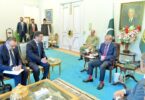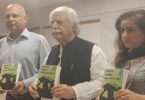F.P. Report
ISLAMABAD: The Trans-Afghan Railway Line Project, agreed between Pakistan, Uzbekistan, and Afghanistan earlier this year, would transform the geo-economic dynamics of the entire Central Asian region.
The project would be the first step in linking the Central Asian transport network with Pakistani seaports of Gwadar, Karachi, and Bin Qasim, the Chairman Senate Muhammad Sadiq Sanjrani said while talking to the Speaker of the legislative Assembly of Oily Majlis of the Republic of Uzbekistan, Nurdinjan Ismailov, who called on him here at Parliament House. During the meeting, wide-ranging talks were held, said a press release. The two dignitaries exchanged views on bilateral, regional, and international issues.
They also reviewed the entire spectrum of bilateral relations with a particular focus on political, trade, security and defense, educational, and cultural domains.
While talking to the speaker of the Oily majlis, the Chairman underlined that Pakistan and Uzbekistan had long cherished cordial bilateral relations in promoting all-round cooperation in different areas including trade, commerce, and culture.
Referring to historic, cultural, and commercial ties, Sanjrani remarked that Pakistan and Uzbekistan were natural partners in promoting regional prosperity and stability.
“Pakistan highly values its fraternal relationship with Uzbekistan. Both the countries have strong historical, religious and cultural linkage”, stated Sadiq Sanjrani.
The Chairman welcomed the Uzbek parliamentary delegation to attend the second General Conference of the Parliamentary Assembly of Economic Cooperation Organisation (PAECO), hosted by the National Assembly of Pakistan, to be held from 1st June-4th in Islamabad.
Sadiq Sanjrani underlined the importance of enhancing political and diplomatic linkages and taking steps to deepen mutual collaboration in the fields of education, culture, trade, economy, defense and tourism.
“Uzbekistan is an important country in Central Asia. Further enhancement of economic cooperation would provide an opportunity for the people and investors of the two countries to come closer”, he further added.
While exchanging views on the CoronaVirus situation, the Chairman said that effective strategies and security measures need to be taken to contain the epidemic at the earliest, so life roll back to normality.
The two also discussed the overall security situation in the region, important global and regional matters of mutual interest, and agreed to continue supporting each other at all international and regional forums, including the UN, OIC, SCO, and ECO.
Both the dignitaries condemned in the strongest terms the recent barbarism being caused by the Israeli occupation forces, adding that Israeli atrocities against the Palestinians are a gross violation of human rights and International law. “The cooperation on the Kashmir issue is a reflection of close ties between the two countries. I am grateful for Uzbekistan’s full support on the Kashmir dispute”, he underscored.
Muhammad Sadiq Sanjarani further added that the issues of Palestine and Kashmir and the recent barbaric actions of Israeli forces are a wake-up call for humanity.
Not only Muslims but the whole world needs to jointly raise their voice on human rights violations, oppression, and barbarism in Palestine and Kashmir, he stressed.
If the parliaments of all the countries adopt a common strategy, these disputes can be resolved. It is time to initiate measures to resolve these conflicts so that peace can prevail in the world, Sanjrani pointed out.
Highlighting the importance of Gwadar, the Chairman Senate observed that Gwadar would prove to be a game-changer not only for Pakistan but also for many countries of the world.
It would be the shortest way to connect the Middle East, Central Asia, Europe, and Africa, which will boost investment and trade in the region.
The Uzbek speaker of Oily Majlis endorsed the views of Sadiq Sanjrani and added that the Uzbek parliament, the Uzbek people, and the government was committed to strengthening cordial relations with Pakistan.
Both the dignitaries stressed promoting public and parliamentary ties between the two countries. He also urged the need for diversification of trade and commercial relations.
The two sides reiterated their determination to maintain the momentum of high-level exchanges and enhance the upward trajectory of bilateral relations.
The Visiting dignitary also recorded his remarks in the “Visitor’s Book”.






